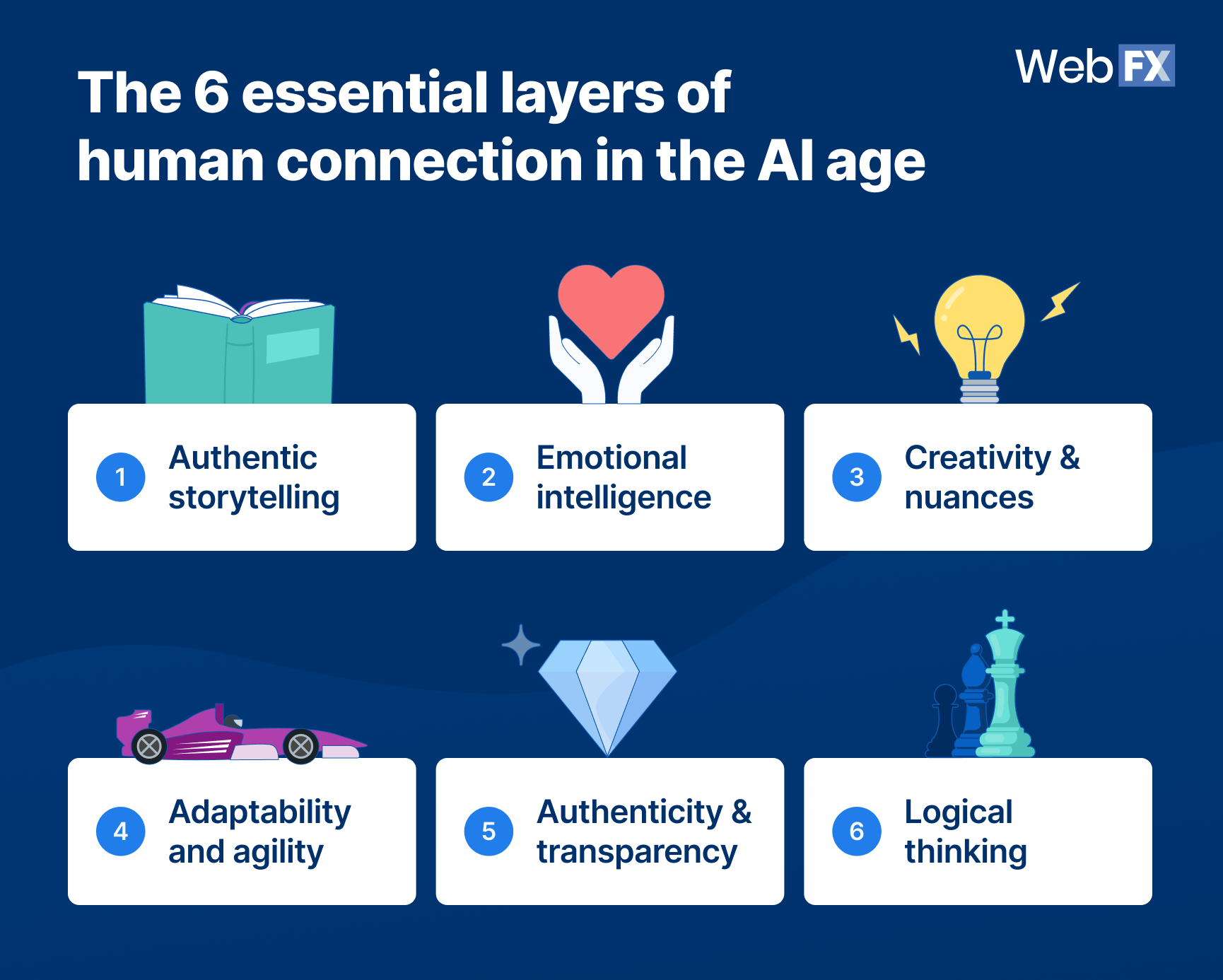-
 Published: Oct 1, 2025
Published: Oct 1, 2025
-
 8 min. read
8 min. read
-
Summarize in ChatGPT
-
 Lornah Ngugi
Lornah Ngugi Marketing Writer
Marketing Writer
- Lornah Ngugi is a seasoned digital marketing writer with 6+ years of experience translating complex marketing strategies into engaging, results-driven content. She holds a B.S. in Business Information Technology and is certified in HubSpot Academy, Google Analytics, LinkedIn Marketing, and Google Digital Academy. Lornah regularly contributes to the WebFX blog and SEO.com, where she’s authored hundreds of marketing guides that help readers turn their goals into measurable results through practical, data-informed insights. When she’s not writing, you’ll find her enjoying a quiet walk in the park, sipping black coffee, or finding creative inspiration in a good chocolate bar.
-
The Winning Strategy: AI as the Engine, Human Connection as the Differentiator
Winning brands use AI as infrastructure, not identity. AI should power systems and scale performance—but human connection powers the brand. Trust, loyalty, and differentiation come from empathy, creativity, and lived experience woven into every AI-driven touchpoint. -
AI Saturation Has Eliminated Technology as a Differentiator
With 88% of organizations already using AI, it’s no longer an advantage—it’s the baseline. From startups to enterprises, everyone has access to the same tools. When technology is universal, it can’t be the thing that sets brands apart. -
The AI Connection Paradox: More Interaction, Less Meaning
AI delivers speed and scale, but not depth. It creates more interactions, yet fewer that feel human. Efficiency alone doesn’t build loyalty—emotional relevance and trust do. -
Authentic Storytelling Is Where Differentiation Begins
AI can write stories, but it can’t live them. Customers connect with real experiences, real values, and real journeys—not polished, automated messaging. Authentic storytelling is what makes brands human and memorable. -
Emotional Intelligence Turns Brands Into Relationships
AI can detect sentiment, but it doesn’t feel it. **Human empathy—the ability to listen, understand nuance, and respond with care—**turns automated moments into meaningful relationships, and transactions into trust.
With AI penetrating every industry and business operation to boost productivity, efficiency, and personalization comes a bigger problem: The paradox of connection. AI creates more interactions than ever, but fewer that feel meaningful.
Yes, AI is essential for staying competitive. But it often falls short at one big thing: Differentiation. When 88% of organizations already use AI in at least one business function, it’s no longer a competitive advantage — it’s table stakes.
So, how are you going to stand out if you’re all using AI in the same cookie-cutter ways, such as sending out AI-personalized email sequences, using AI chatbots to answer FAQs, and automating customer service responses with identical scripts?
The answer is not choosing between humans and machines, but seamlessly blending AI with human skills. Done right, the combination enhances both: AI brings speed, scale, and accuracy, while humans bring trust, empathy, and credibility. That’s where real differentiation lives.
How AI-saturated is the market?
The impact of AI saturation is already being felt, with 1 in 3 people using AI multiple times a day.
AI has taken over so many processes that now, everywhere you turn, there’s AI-generated content and campaigns. The question is no longer whether or not you’re integrating AI, but how you’re doing it to resonate with your audiences.
Other than cookie-cutter AI use cases, another reason why AI is no longer the differentiator, but the baseline, is that popular AI tools like ChatGPT, Gemini, and Perplexity have low entry barriers, making them widely available.
So, now that everyone, from solopreneurs to Fortune 500 companies, is using the same tools, the results are the same in quality and quantity. This means a two-person startup can now produce the same volume of content or customer touchpoints as a mid-size company, at a comparable speed. As a result, you erase the competitive advantage of adopting AI.
The 6 essential layers of human connection in the AI era
AI may have leveled the playing field by giving everyone access to the same tools, but now comes the challenge of setting your business apart. So, if the technology is not the differentiator? What is? The people behind it!
Let’s explore the human characteristics that form connections that AI will never replace.
- Authentic storytelling
- Emotional intelligence
- Creativity and nuances
- Adaptability and agility
- Authenticity and transparency
- Logical thinking

1. Authentic storytelling
AI can create narratives, but it cannot live a journey. It may write the “why” behind your brand, but may fall short in elaborating the battles you’ve fought and the values you refuse to compromise on with as much heart and soul as you would.
Customers don’t want yet another AI-polished “About Us” filled with buzzwords, like “cutting-edge” and “solutions-oriented,” or cookie-cutter promises emphasizing quality and results. They want to know what the raw, real story is that makes your brand human and relatable.
Unfortunately, AI can’t give them that! It’s limited to patterns of corporate language and avoids imperfections. You can use AI to structure your content, but you’ll need a human to give it heart and meaning by sharing lived experiences, a company’s authentic behind-the-scenes stories, and ownership of past mistakes.
2. Emotional intelligence
AI can detect and mimic sentiment and human emotions, but it doesn’t feel. AI tools don’t understand the layered emotions hidden behind words.
Genuine empathy can only come from humans because they can listen, read between the lines, sense frustration or excitement, and respond with compassion. This emotional resonance turns transactions into meaningful, long-term relationships.
A good example of how you can infuse emotional intelligence into everyday workflows that are currently running on AI is replacing template responses, like “We apologize for the inconvenience,” with more personalized responses, like “I can hear how frustrating this must have been, and I want to help you fix it.”
Additionally, your customers will appreciate emotionally charged follow-ups with human team members after having AI-powered chatbots handle FAQs.
3. Creativity and nuances
AI creates replies based on the patterns and probabilities observed from the information it’s trained on. Humans, on the other hand, are the baseline for originality and creativity thanks to our ability to create from lived experiences, cultural context, emotions, and failures.
True creativity isn’t about generating more options — it’s about making unexpected connections that move people. And that’s still a uniquely human skill.
For example, an AI can generate a hundred slogans for a shoe brand, but it takes a human who’s actually run a marathon in the rain to come up with one that feels raw and real.
Before AI, Nike landed the unforgettable slogan “Just Do It” based on the last words of a convicted criminal facing execution. In today’s AI era, we’d probably be working with the likes of “Push Forward” or “Run Faster” as AI tools may rule them as more relatable to Nike’s audience.
4. Adaptability and agility
AI, unlike humans, can’t pivot in real time. It thrives on patterns and instructions while also being risk-averse and defaults to safe outputs when circumstances are messy, unpredictable, or ambiguous.
On the flip side, people can easily adapt to evolving trends, market shifts, and cultural sensitivity, bringing a fresh perspective to every campaign. A human touch in your digital marketing campaigns leaves room to pivot campaigns in response to real-life events and trends.
While AI can help create high-performing campaigns and offer options to optimize as you go, it requires an experienced marketer with a good understanding of the expected campaign results to reframe the strategy while it’s already rolling.
The human ability to adapt, read the room, and pivot under pressure — is what keeps AI-led strategies relevant and resilient. Plus our ability to experiment, test bold ideas, and learn from failure, and adjust accordingly.
5. Authenticity and transparency
Authenticity is the new currency of trust. Yet, AI is known for publishing polished but sometimes hollow outputs that avoid messy truths, vulnerability, and controversial conversations. Unfortunately, this won’t cut it for today’s audiences that have access to businesses using the same AI playbook, but limited to scarce genuine human connections.
Human connection is the key to unlocking unmatched authenticity and transparency because who else can tell your story as well as you do?
Humans are innately more transparent and authentic because they can admit imperfection and flaws. For instance, an AI-generated response to an airline canceling numerous flights would be, “We apologize for the inconvenience.” Unfortunately, this response is likely to spark even more frustration and cynicism among clients that could fuel backlash and erode trust.
In contract, when a human CEO goes on record saying, “We failed our customers this weekend. I take full responsibility, and here’s what we’re doing so it never happens again,” you will solicit warmth and understanding from clients. They will feel seen and heard, and as a result, restore their trust and credibility.
6. Logical thinking
Human intelligence or logic sets apart from other creatures because it enables us to assess situations and environment and make consequent decisions. For every encounter, we make small compounding decisions based on not only what to do, but why it matters.
Wait, isn’t that the same thing AI does? On the surface, yes! However, AI models mimic logic by processing big data and producing outputs that look like reasoned decisions. Contrastingly, human logic isn’t just pattern recognition — it’s context-driven, value-informed, and consequence-aware.
Here’s the catch: Logic is not only about computation but also about consequence. A human marketer will help you differentiate your business better than an AI tool because they can project second-order effects.
They’ll foresee that launching this now might look opportunistic, but it may damage your reputation in the long term. However, AI doesn’t understand reputation risk the way humans do, so you may end up celebrating short-term wins without considering the consequent long-term risks.
Let’s use AI as infrastructure and humans as the heartbeat of brands
To win clients and gain their trust in the currently AI-saturated market, you need to leverage human connection as your x-factor. Treat AI systems, processes, and engines as infrastructure without the intention of inspiring loyalty or sparking emotion.
Then, use human stories, empathy, creativity, and judgment to give your brand its soul. Ultimately, the companies that will thrive won’t be the ones with the most advanced AI tools, but the ones that know how to weave humanity into every AI-powered touchpoint.
To make the most of your AI tools and get ahead of competition, check out WebFX AI consulting services. Working with us provides you access to our 8+ years of experience in AI and experts know how to blend cutting-edge technology with human creativity and strategy.
-
 Lornah Ngugi is a seasoned digital marketing writer with 6+ years of experience translating complex marketing strategies into engaging, results-driven content. She holds a B.S. in Business Information Technology and is certified in HubSpot Academy, Google Analytics, LinkedIn Marketing, and Google Digital Academy. Lornah regularly contributes to the WebFX blog and SEO.com, where she’s authored hundreds of marketing guides that help readers turn their goals into measurable results through practical, data-informed insights. When she’s not writing, you’ll find her enjoying a quiet walk in the park, sipping black coffee, or finding creative inspiration in a good chocolate bar.
Lornah Ngugi is a seasoned digital marketing writer with 6+ years of experience translating complex marketing strategies into engaging, results-driven content. She holds a B.S. in Business Information Technology and is certified in HubSpot Academy, Google Analytics, LinkedIn Marketing, and Google Digital Academy. Lornah regularly contributes to the WebFX blog and SEO.com, where she’s authored hundreds of marketing guides that help readers turn their goals into measurable results through practical, data-informed insights. When she’s not writing, you’ll find her enjoying a quiet walk in the park, sipping black coffee, or finding creative inspiration in a good chocolate bar. -

WebFX is a full-service marketing agency with 1,100+ client reviews and a 4.9-star rating on Clutch! Find out how our expert team and revenue-accelerating tech can drive results for you! Learn more
Try our free Marketing Calculator
Craft a tailored online marketing strategy! Utilize our free Internet marketing calculator for a custom plan based on your location, reach, timeframe, and budget.
Plan Your Marketing Budget

See AI Marketing in Action
Explore how WebFX helped a regional brand get discovered in AI search experiences — proving what’s possible with today’s AI-driven marketing!

Proven Marketing Strategies
Try our free Marketing Calculator
Craft a tailored online marketing strategy! Utilize our free Internet marketing calculator for a custom plan based on your location, reach, timeframe, and budget.
Plan Your Marketing Budget
What to read next




